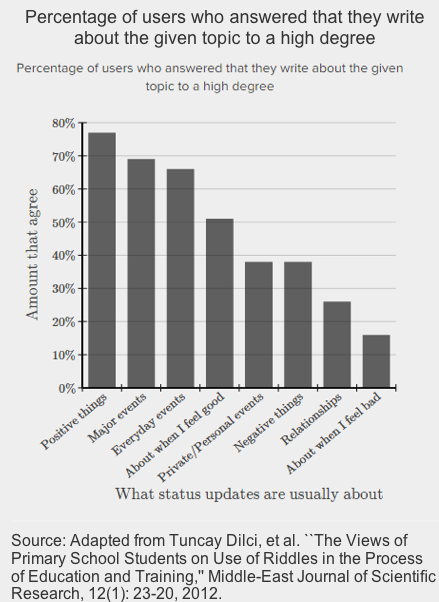Questions 1-11 are based on the following
passage.
Adapted from Terry F. Pettijohn II, Kimberly E. LaPiene, Terry F. Pettijohn, and Amanda L. Horting, "Relationships between Facebook Intensity, Friendship Contingent Self-Esteem, and Personality in U.S. College Students." (C) 2012 by Terry F.Pettijohn II et al.
Online social networking sites, such as Facebook,
Google, and Bebo, have grown in popularity in recent years
and they provide an exciting new area of study in the field of
psychology. Facebook provides individuals with easy access
5 to view personal information about their friends, coworkers,
and even complete strangers. Facebook has over 500 million
active users and every month over 700 billion minutes are
spent on Facebook. Among U.S. college students, 96% have
a Facebook account. Given the popularity of online social
10 networking sites, Facebook in particular, the current study
was designed to investigate the relationship between
Facebook use, the importance of quality of friendships to
self-esteem, and personality in college students.
Social relationships are considered by many to be the most
15 important component of human life. With the expansion of
the Internet and social networking sites, more people are
using technology to communicate with their friends and
family online and maintain these interpersonal connections in
novel ways that were not available in previous generations.
20 Some researchers initially believed online activities
negatively impacted relationships and feared that virtual
communication would replace face-to-face interactions and
deteriorate social bonds. Others, however, have found
support for the idea that social networking sites and the
25 Internet have expanded methods of staying socially
connected with others and increased relationship closeness
and connectedness. Social networking sites, such as
Facebook, allow users to add “friends” and keep track of
their status, interests, photos, “likes,” and updates of others’
30 personal information in cyberspace.
Internet use is related to both positive and negative
psychological and social factors, but the key to understanding
these outcomes is through examining specific types of
Internet use instead of simply the amount of time spent
35 online. While using social media can have positive benefits
associated with community engagement, education, social
connectedness, and identity development, it can also lead to
risks linked to social rejection, cyberbullying, depression,
exposure to inappropriate content, and other negative
40 consequences related to general well-being. For example, a
negative relationship has been found between time spent
using electronic media, including social networking sites, and
college grades. In college, upper-class students with more
Facebook friends reported high levels of social adjustment
45 and stronger attachment to the college than students with less
Facebook friends, although freshmen did not benefit from
having more Facebook friends and actually reported
decreased social and emotional adjustment.
With respect to self-esteem, the research is also mixed,
50 especially considering the different types of self-esteem. In
certain cases, excessive Facebook use may be related to
lower general self-esteem. For example, Mehdizadeh (2010)
found a significant negative correlation between self-esteem
and the number of times students checked Facebook per day
55 and between self-esteem and the time spent on Facebook per
session. Those with lower self-esteem also presented less
self-promoting content on Facebook pages. However,
Facebook can enhance self-esteem specifically related to the
social functions of the self (social self-esteem) when
60 individuals receive positive comments and feedback from
their friends online. In addition, researchers have found that
introverted individuals and individuals with low self-esteem
may benefit from the social opportunities provided by the
Facebook interface, without the anxiety of interacting face-
65 to-face.
Facebook provides an opportunity for individuals who
value their friendships to stay informed about social events
and this technology may be particularly important and highly
utilized by individuals whose value of themselves is
70 contingent on how well their relationships with friends are
succeeding... Related to the current investigation, the quality
of friendships and how this quality affects self-esteem may
be correlated with the frequency and intensity in which
individuals engage in social networking. Individuals who
75 value their friendships and see these friendships as important
dimensions of themselves may engage in increased social
networking behaviors to provide additional means for
keeping connected with friends and sharing personal
activities.
* Changed for cultural accuracy.